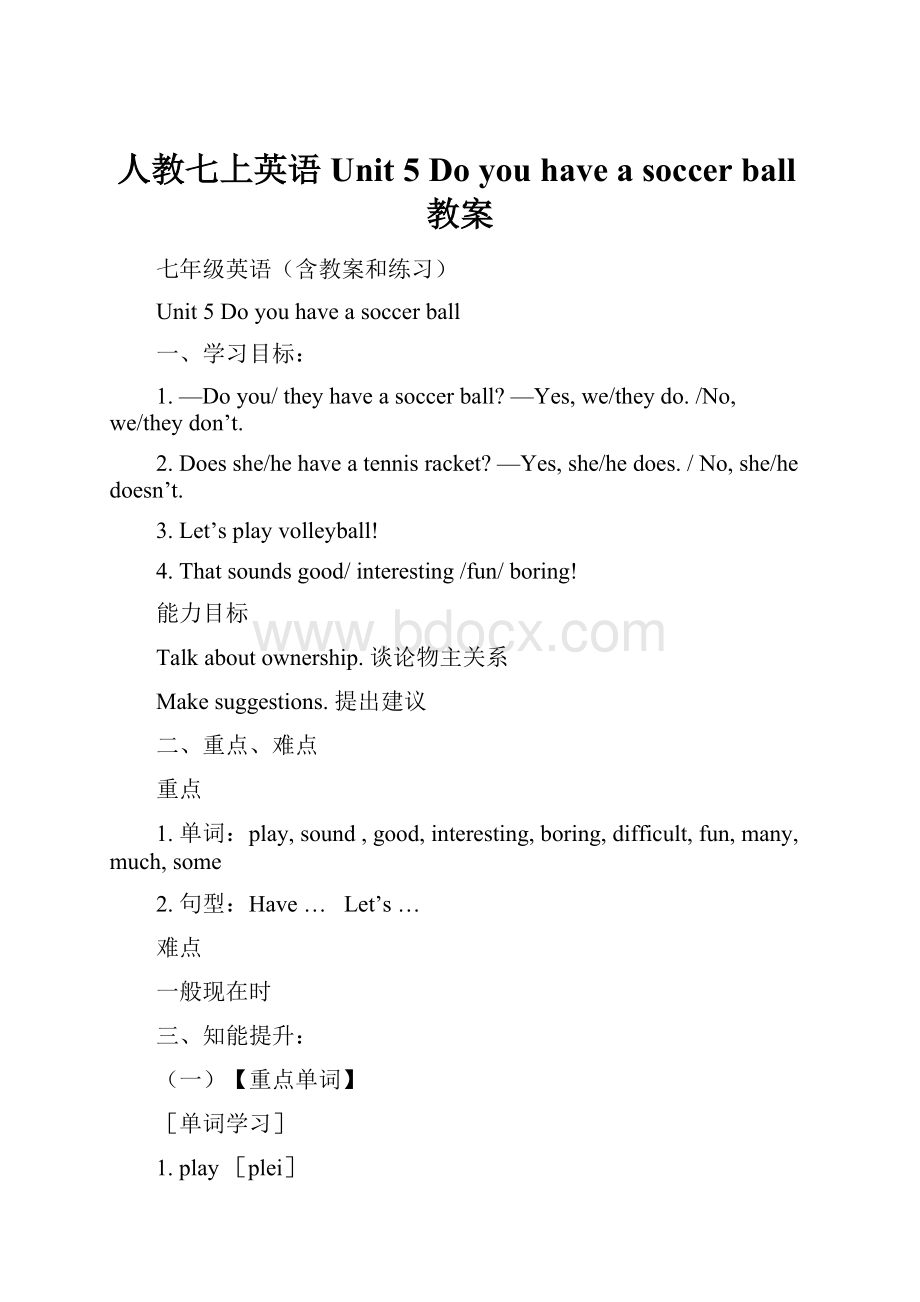 人教七上英语Unit 5 Do you have a soccer ball教案.docx
人教七上英语Unit 5 Do you have a soccer ball教案.docx
- 文档编号:25581933
- 上传时间:2023-06-09
- 格式:DOCX
- 页数:13
- 大小:22.24KB
人教七上英语Unit 5 Do you have a soccer ball教案.docx
《人教七上英语Unit 5 Do you have a soccer ball教案.docx》由会员分享,可在线阅读,更多相关《人教七上英语Unit 5 Do you have a soccer ball教案.docx(13页珍藏版)》请在冰豆网上搜索。

人教七上英语Unit5Doyouhaveasoccerball教案
七年级英语(含教案和练习)
Unit5Doyouhaveasoccerball
一、学习目标:
1.—Doyou/theyhaveasoccerball?
—Yes,we/theydo./No,we/theydon’t.
2.Doesshe/hehaveatennisracket?
—Yes,she/hedoes./No,she/hedoesn’t.
3.Let’splayvolleyball!
4.Thatsoundsgood/interesting/fun/boring!
能力目标
Talkaboutownership.谈论物主关系
Makesuggestions.提出建议
二、重点、难点
重点
1.单词:
play,sound,good,interesting,boring,difficult,fun,many,much,some
2.句型:
Have…Let’s…
难点
一般现在时
三、知能提升:
(一)【重点单词】
[单词学习]
1.play[plei]
与不同的词搭配表示不同的意思。
【用法1】
vt.玩(游戏);打(球);踢(球)
【考点】
与play搭配使用时,球类名词前不加冠词
【例句】
playfootball踢足球
playbasketball/tabletennis打篮球/乒乓球
【用法2】
vt.演奏
【考点】
与play搭配使用时,乐器类名词前加定冠词the,表示“弹奏……”
【例句】
playthepiano弹钢琴
playtheguitar弹吉他
【考题链接】
1.Ilikemusic.Iplay_____violinafterschool.
A.aB.anC.theD./
2.Let’splay______basketballtogether.
A.aB.anC.theD./
答案:
1.C2.D
解题思路:
1.与play搭配使用时,乐器类名词前加定冠词the,表示“弹奏……”
2.与play搭配使用时,球类名词前不加冠词。
2
.sound[saund]
【用法1】
n.声音,响声
【例句】
Ilikethesoundofpiano.我喜欢钢琴的声音。
【用法2】
v.听起来
连系动词,其后接名词,形容词或介词短语作表语。
【例句1】
A:
Let’sgotothepark.
B:
Thatsoundsinteresting.那听起来很有趣。
【解析】
that指上句所提的建议,英语中指代前面所述的内容或事情,通常用that而不用this。
that属第三人称单数,故谓语动词sound后应加s。
【例句2】
A:
DoyoulikeMary’sstory?
你喜欢玛丽(所讲)的故事吗?
B:
No,Idon’tlikeit.Thestorysoundsboring.不,我不喜欢。
这个故事听起来很乏味。
【辨析】
hear
vt.听见指听到的结果
Ican’thearyourvoice.我听不见你的声音。
listen['lisn]vi.听指听的动作
She'slisteningtotheradio.她在听广播。
【考题链接】
A:
Iwanttoplayvolleyballwithmyfriends.Doyouwanttocome
withme?
B:
Sure.That_____interesting.
A.soundB.soundsC.hearD.hears
答案:
B
解题思路:
根据语境含义:
那听起来很有趣,可知选
B项。
3.good,interesting,boring,difficult,fun
【用法】
这些形容词主要用在名词前作定语或在系动词后作表语。
Sheisagoodteacher.她是一个好老师。
Thisisaninterestingbook.这是一本有趣的书。
PlayingwithJackisveryboring.和杰克玩很无聊。
It’sadifficultquestion.Ican’tanswerit.这是一个很难的问题。
我答不出来。
Ihadafunweekend.我过了一个有趣的周末。
这些形容词前还可以用副词来修饰。
Thisisaveryinterestingbook.这是一本很有趣的书。
It’stoodifficult.它太难了。
【交际口语】
Thatsounds+形容词。
“那听起来……”(用来表达个人观点)
褒义的评价可选用:
interesting,fun,relaxing,good,wonderful
贬义的评价可选用:
boring,terrible,bad
【例句1】
A:
Let’swatchTV.
B:
Thatsoundsbad.Iwanttoplayvideogames.
【解析】
sound在这里是连系动词,作“听起来……”讲,其后接一个形容词作表语。
【例句2】
Yourideadoesn’tsoundgood.你的主意听起来好像不行。
【拓展】
与sound类似的连系动词还有:
look(看起来……,显得……),taste(尝起来……),smell(闻起来……)。
【例句】
Thesongsoundsbeautiful.这
首歌听起来很优美。
Thatstorysoundsveryinteresting.这个故事听起来很有趣。
Yourwatchlooksverynice.你的手表很好看。
【拓展】
类似的表达法:
lookhappy看上去很高兴
soundlike听起来像……
looklike看起来像……
4.many,much,some
manyadj.大量的,许多的
【用法】
修饰可数名词。
【例句】
Ihavemanyfriends.我有许多朋友。
muchadj.很多的,大量的
【用法】
修饰不可数名词。
【例句】
Ther
eismuchwaterinthebottle.瓶子里有许多水。
someadj.一些
【用法】
既可以修饰可数名词又可以修饰不可数名词
【例句】
ShehassomeapplesandIhavesomemilk.她有一些苹果,我有一些牛奶。
【考题链接】
用many,much填空
A:
Look!
Thereare______toycarsintheshop.
B:
Theyaresocool.ButIdon’thave_____money.Wec
an’tbuythem.
答案:
many;much
解题思路:
toycar玩具汽车——可数名词,可用many修饰。
money钱——不可数名词,可用much修饰。
5.good,well辨析
goodadj.好的
【用法】
可用在名词前修饰名词,充当定语
也可用于连系动词后,作表语。
【例句】
Lindaisagoodgirl.琳达是个好女孩。
Thisrestaurantisverygood.这家饭店很好。
welladv.很好地;满意地
【用法】
作副词时,用来修饰形容词,副词或动词,在句子中作状语。
【例句】
Dotheboyseatwellatschool?
孩子们在学校吃得好吗?
Heplayssoccerwell.他踢球踢得很好。
[即学即练]
1.A:
Doyouwanttoplay________afterschool?
B:
Yes,Ido.
A.basketballB.
abasketballC.thebasketballD.somebasketballs
2.Iamhungry.Iwanttoeat______rice.
A.manyB.someC.anyD.alot
3.That_______agoodidea.
A.listentoB.soundsC.hearD.listen
答案:
1.A.2.B3.B
(二)【重点句型与表达】
[句型学习]
1.Doyouhave
…?
【用法1】
vt.拥有,占有。
其主语可以指人,也可以指物,其第三人称单数形式为has。
【例句】
Ihaveafriendhere.我这儿有个朋友。
Shehasthreedictionaries.她有三本词典。
Thiscoathasnopockets.这件衣服没有口袋。
【结构】
Ihaveapen.
Ido
n’thaveapen.
—Doyouhaveapen?
—Yes,Ido./No,Idon’t.
Hehasapen.
Hedoesn’thaveapen.
—Doeshehaveapen?
—Yes,hedoes./No,hedoesn’t.
【拓展】
Ihaveabook.It’smybook.
Youhaveadog.It’syourdog.
Shehasapen.It’sherpen.
Hehasabike.It’shisbike.
WehaveaTV.It’sourTV.
Theyhaveaball.It’stheirb
all.
【考点】
JimandTomhaveacomputer.吉姆和汤姆有一台电脑。
(两人共有,主语是复数)
Jimhasacomputer.吉姆有一台电脑。
【难点】
have有……
therebe某地有某物、某人
have强调的是拥有或占有,主语一般是名词或代词,其与主语是所属关系。
Thereis/are...表示某处有某物或某人,强调的是一种客观存在。
【例句】
Ihavetwobrothersandonesister.我有两个兄弟,一个姐姐。
Mysisterhastwotoysbu
tIhaveone.我妹妹有两个玩具,而我只有一个。
※有时therebe结构和have可互换。
Therearetwentyclassesinourschool.=Wehavetwentyclassesinourschool.
我们学校有二十个班级。
【用法2】
havevt.吃,喝
【例句】
Wehavelunchatschool.我们在学校吃午饭。
Hewantstohaveacupoftea.他想喝杯茶。
【考题链接】
用thereis,thereare,have,has填空。
(1)Doesshe
_____abrother?
No,shedoesn’t.
(2)Look!
______acatunderthechair.
(3)Mike_____aping-pongball.Buthedoesn’thaveaping-pongbat.
(4)______manyinterestingbooksatschool.
答案:
1.have2.Thereis3.has4.Thereare
2.Let’splayping-pong.让我们打乒乓球吧。
【用法1】
letsb.dosth.“让某人做某事”表示说话人的建议
【例句】
It’stoolate.Iwanttogohome.Letmego.太晚了。
我想回家。
让我走吧。
Ihaveaninterestingpicture.LetLucylookatthepicture.
我有一幅有趣的画。
让露西看看这幅画。
【用法2】
let’s=letus表示“让我们……吧”,用于提出建议或征求别人意见。
【例句】
Let’sgo!
让我们走吧!
Let’sgotothepark!
让我们去公园吧!
肯定回答:
OK./Allright./Yes,let’s…/Thatsounds…
否定回答:
Sorry,I…
[即学即练]
根据语境的含义,把单词填在正确的位置。
doesn’tLet’ssoundsaskhave
A:
Doyou_____aping-pongball?
B:
Yes,Ido.
A:
_____playping-pong!
B:
ButIdon’thaveaping-pongbat.
A:
That_____toobad.Let’saskPeter.
B:
He_____likesports.Hedoesn’thaveone.Let’sgoand_____myfather.
A:
OK.Let’sgo.
答案:
haveLet’ssoundsdoesn’task
(三)【重点语法】
[语法学习]
【概念】时态
英语中不同的时间发生的动作或状态要
用谓语动词的不同形式来表示。
动词的时态可以分为现在时、过去时和将来时,每种时态中含有一般,进行,完成和完成进行等形式。
1.我正在看电视。
IamwatchingTVnow.
2.昨天我在家看电视。
IwatchedTVathomeyesterday.
3.明天我要看电视。
IwillwatchTVtomorrow.
4.我每天都看电视。
IwatchTVeveryday.
【解析】
一般现在时的含义
1.表示现在的状态。
Theyareattable.他们在用餐。
Jackistwelve.杰克12岁了。
2.表示经常的或习惯性的动作。
Igotoschoolatseveninthemorning.我早晨7点去上学。
IwatchTVeveryday.我每天都看电视。
3.表示主语具备的性格和能力。
Shelikesfishverymuch.她很喜欢吃鱼。
WespeakChinese.我们讲汉语。
【结构】
谓语动词的构成形式
1.谓语动词是be动词。
Iamtwelve.→Iamnottwelve.
Youaretwelve.→Youarenottwelve.
She/He/Itis…→She/He/Itisnot…
They/Weare…→They/Wearenot…
一般疑问句:
Areyou…?
简略回答:
Yes,Iam/weare./No,I’mnot/wearen’t.
Ishe/she
/it…?
Yes,he/she/itis./No,he/she/itisn’t.
Arethey/we…?
Yes,they/weare./No,they/wearen’t.
2.谓语动词是实义动词do。
I/We/You/Theylikeapples.→I/We/You/Theydon’tlikeapples.
He/She/Itlikesapples.→He/She/Itdoesn’tlikeapples.
Doyou/we/theylikeapples?
简略回答:
Yes,I/we/they/youdo.
/No,I/we/they/youdon’t.
Doesshe/he/itlikeapples?
Y
es,she/he/itdoes./No,she/he/itdoesn’t.
[即学即练]
按要求完成下列句子
1.Ihaveavolleyball.(改为否定句)
I____________________avolleyball.
2.Hisbrotherhasabaseball.(改为一般疑问句)
__________hisbrother__________abaseball?
3.—Doyourparentshaveacomputer?
(作出肯定回答)
—Yes,____________________.
4.—DoesMaryhaveatennisracket?
(作出否定回答)
—__________,____________________.
5.Lucyhastwobrothers.(改为否定句)
Lucy____________________twobrothers.
答案:
1.don’thave
2.Does,have
3.theydo
4.No,shedoesn’t
5.doesn’thave
预习导学
Unit6Doyoulikebananas?
一、预习新知
1.单词:
orange,salad,icecream,broccoli等与食物有关的单词
2.句型:
Doyoulike…?
你喜欢……吗?
二、预习点拨
思考问题1:
你能借助字典查出多少水果的英文名称?
思考问题2
:
你能用英语调查出在你们家最受欢迎的水果是什么吗?
- 配套讲稿:
如PPT文件的首页显示word图标,表示该PPT已包含配套word讲稿。双击word图标可打开word文档。
- 特殊限制:
部分文档作品中含有的国旗、国徽等图片,仅作为作品整体效果示例展示,禁止商用。设计者仅对作品中独创性部分享有著作权。
- 关 键 词:
- 人教七上英语Unit Do you have soccer ball教案 人教七上 英语 Unit ball 教案
 冰豆网所有资源均是用户自行上传分享,仅供网友学习交流,未经上传用户书面授权,请勿作他用。
冰豆网所有资源均是用户自行上传分享,仅供网友学习交流,未经上传用户书面授权,请勿作他用。


 《初级会计实务》试题题库大全及答案详解.docx
《初级会计实务》试题题库大全及答案详解.docx
